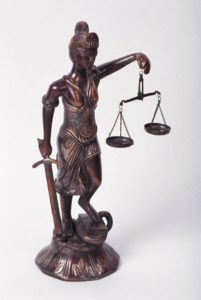No “Subject Matter Waiver” of Privilege From Disclosure in Business Transaction
Sharp Thinking
Thinking
No. 80 Perspectives on Developments in the Law from The Sharp Law Firm, P.C. December 2012
No “Subject Matter Waiver” of Privilege From Disclosure in Business Transaction
By John T. Hundley, jhundley@lotsharp.com, 618-242-0246
The doctrine of “subject matter” waiver of privilege does not apply to the extra-judicial disclosure of attorney-client communications not thereafter used by the client to gain an adversarial advantage in litigation, the Illinois Supreme Court held late last month.

Hundley
Under the doctrine of subject matter waiver, the waiver of privilege as to a given communication, or part thereof, operates as a waiver as to all communications on the same subject matter. As regards disclosures made outside of judicial proceedings, the case was one of first impression in the Supreme Court and one of only a handful of appellate decisions nationwide. Center Partners, Ltd. v. Growth Head GP, LLC, 2012 IL 113107.
The decision reversed the judgment and much of the reasoning of the Appellate Court decision reported at 2011 IL App (1st) 110381. See Sharp Thinking No. 52 (Sept. 2011). It involved the sharing of privileged information among buyers and sellers in a business transaction, but the court said it did “not limit our holding only to advice given in business transactions”.[1]
Background Complex: In Center Partners, buyers and sellers had shared privileged information as part of the negotiation and structuring of the sale of numerous shopping center properties. As part of the transaction, buyers acquired a majority interest in one of the limited partnerships formerly operated by the sellers. After the transaction, limited partners of that partnership sued both the buyers and the sellers claiming breaches of fiduciary and contractual duties to them.
The privilege issues arose in the trial court in three waves. First, plaintiffs sought documents that had been shared among the parties. The trial court ordered those documents’ production, but appeared to hold that waiver as to their entire subject matter had not occurred. Next, plaintiffs sought to require defendants’ witnesses to testify on the same subject matter in depositions. The trial court refused the request. Finally, plaintiffs sought 1,500 documents not shared during the negotiations but on the same subject matter as those shared. The trial court then ruled that because “[d]efendants had shared privileged communications it follows that the subject of those communications is susceptible to discovery.” The Appellate Court affirmed (see Sharp Thinking No. 52), but the Supreme Court reversed.
Usual Rule Distinguished: The high court noted the “well-settled rule . . . that when a client discloses to a third-party a privileged communication, that particular communication is no longer privileged
and is discoverable or admissible in litigation” (emphasis added). It further conceded that “Illinois has long recognized the doctrine of subject matter waiver,” but noted that prior holdings under that doctrine had involved disclosures made in connection with court proceedings. The doctrine is justified in that context because of the “shield and sword” theory: “a litigant should not be able to disclose portions of privileged communications with his attorney to gain a tactical advantage in litigation (the sword), and then claim the privilege when the opposing party attempts to discover the undisclosed portion of the communication or communications relating to the same subject matter” (the shield). To avoid such prejudice, a waiver as to the entire subject matter is held.
However, the court noted that in the business negotiation setting, concerns of prejudice are absent, as the introduction of such communications into the business negotiations does nothing to cause prejudice to the opponent in court or to subvert the “truth-seeking” court process.
Impact On Deals Noted: The court conceded that a number of trial courts across the country had appeared to hold that subject matter waiver applied even to extra-judicial disclosures, but it said  cases declining to extend subject matter waiver to extra-judicial disclosures were “more persuasive.” In addition, citing In re Keeper of the Records, 348 F.3d 16 (1st Cir. 2003), it noted that finding subject matter waiver in the business transaction context “would provide perverse incentives: parties would leave attorneys out of commercial negotiations for fear that their inclusion would later force wholesale disclosure of confidential information.” Quoting another case, it said that “[l]egal doctrine that impedes frank communication between buyers and sellers also sets the stage for more lawsuits,” which is to be discouraged.
cases declining to extend subject matter waiver to extra-judicial disclosures were “more persuasive.” In addition, citing In re Keeper of the Records, 348 F.3d 16 (1st Cir. 2003), it noted that finding subject matter waiver in the business transaction context “would provide perverse incentives: parties would leave attorneys out of commercial negotiations for fear that their inclusion would later force wholesale disclosure of confidential information.” Quoting another case, it said that “[l]egal doctrine that impedes frank communication between buyers and sellers also sets the stage for more lawsuits,” which is to be discouraged.
The court said it is “of no matter” if disclosure was made to gain a tactical advantage during the business negotiation, provided no law or ethics rule was broken.
Work-Product Issue Avoided: The reversal on privilege grounds meant the high court did not have to address that portion of the Appellate Court decision which held that the work-product doctrine did not apply because the lawyers were not working “in anticipation of litigation.” See Sharp Thinking No. 52. The Supreme Court opinion is silent on that issue.
Distinguishable Contexts Apparent: It bears emphasizing that the plaintiffs in Center Part-ners were only limited partners, whom the court implicitly treated as strangers to the disclosures and to the privilege. The limited partnership was publicly held, so perhaps the court’s treatment was justified on that basis, though some explicit analysis on this aspect would have been helpful. Look for future disagreement as to whether the same rule holds when the limited partnership is small and closely-held.
the privilege. The limited partnership was publicly held, so perhaps the court’s treatment was justified on that basis, though some explicit analysis on this aspect would have been helpful. Look for future disagreement as to whether the same rule holds when the limited partnership is small and closely-held.
Look also for arguments that a different rule applies when the dispute arises between the parties to the transaction (the “morning after” issue addressed in our previous writing (see n.1)). Though the high court opinion arguably would support a no-subject-matter-waiver rule in that context, the court expressly assumed no law or ethics duty would be broken. Plaintiffs can be expected to argue that the no-subject-matter-waiver rule thus does not apply when a fraud allegedly is committed in connection with the transaction
[1] For an early discussion of the issues that arise in these sorts of business cases, see Hundley, White Knights, Pre-Nuptial Confidences, and the Morning After: The Effect of Transaction-Related Disclosures on the Attorney-Client and Related Privileges, 5 DePaul Bus. L.J. 59 (1992-93).
THE SHARP LAW FIRM, P.C.
1115 Harrison, P.O. Box 906, Mt. Vernon, IL 62864 • Telephone 618-242-0246 • Facsimile 618-242-1170 • www.thesharpfirm.com
Business Transactions • Litigation • Financial Law • Problem Finances • Real Estate • Corporate • Commercial Disputes • Creditors’ Rights •
Arbitration • Administrative Law • Employment Matters • Estate Planning • Probate • Family Matters
Terry Sharp: Tsharp@lotsharp.com; John T. Hundley: Jhundley@lotsharp.com; Rebecca L. Reinhardt: Rreinhardt@lotsharp.com;
Bentley J. Bender: Bbender@lotsharp.com
No. 80
